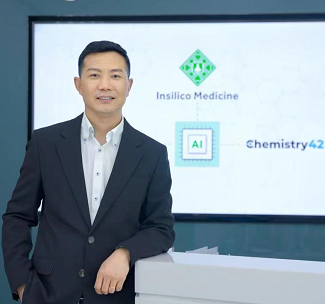AI, ChatGPT And The Future Of Drug Discovery: China Biotech CEO Podcast With Insilico's Co-CEO
New Approach Starting From Patients
Executive Summary
After securing US orphan designation for an artificial intelligence-assisted therapeutic, Insilico's co-CEO Feng Ren sits down for a wide-ranging interview in which he discusses why AI drug discovery is more predictable, efficient and cost-effective than the conventional bench-to-bed model. AI's limitations and validations, why the industry should get excited about algorithms, data sets and deep learning are other topics to consider in this fast-growing field.
Hong Kong- and Shanghai-based artificial intelligence drug discovery company Insilico Medicine recently had the best month in its history, as a small molecule discovered using its technology, INS018-055 for idiothetic pulmonary fibrosis (IPF), obtained orphan drug designation from the US Food and Drug Administration.
Insilico co-CEO Feng Ren comes from a chemistry background. After graduating from Harvard University in the US, he worked for GSK plc for 11 years, including a stint in China as head of Chemistry. He then joined contract research organization Medici for three years before becoming head of Drug Discovery in February 2021.
Now, he oversees collaboration and operations for Insilico in China, which has an ambition to develop a novel drug by harnessing the power of AI.
During the exclusive hour-long audio interview, the executive touched on many key issues surrounding the myths of AI-assisted drug discovery, the reasons behind the selection of IPF as a first indication, ChatGPT’s potential use in new drug discovery and the ongoing challenges in the field such as time-consuming validation and the large data sets required.
Multiple Benefits But Validation Needed
Outlining the evolution of AI in drug R&D spanning two decades and the recent high interest in OpenAI's technology, Ren observed that AI could reduce by 40-60% the time and number of compounds required for discovery. While 200-500 compounds are currently regularly synthesized for chemistry work, with AI only 70-100 may be needed to reach the proof of concept stage.
However, many of the 150 or so novel drugs already discovered using AI have yet to fully validated. AI also touches upon only a specific aspect of drug discovery, and the predictability of safety profiles remains low and largely dependent on algorithms and data, he noted.
Insilico started with aging studies, one reason it chose IPF as its first indication, given that it has data on the disease. Beside the IPF asset, which will enter Phase II trials this March, the company is also developing an antiviral for COVID-19, which recently obtained IND approval in China.
The PL-13 inhibitor is in the same class as Paxlovid (nirmatrelvir and ritonavir) and Ren said it has fewer manufacturing synthesis steps compared with the Pfizer Inc. drug, which he expects to make it more cost-effective.
Billing itself as an AI-powered biotech, Insilico sees much room for growth for AI use in drug discovery and has already licensed its platform to some multinational pharma firms. There are still chances for professionals hoping to join the fray as long as they have the requisite special skills and remain focused, Ren concluded.
This and all our other podcasts are available on the Pharma Intelligence channel on Apple Podcasts, Google Podcasts, SoundCloud, TuneIn and Spotify Podcasts, and via smart speakers if one of these platforms has been set up as your default podcast provider.
0001-0005: AI-assisted drug discovery overview
0006-0010: ChatGP validates initial doubts about AI implications, generative model
0011-0015: Why choose IPF as a first indication, Pandomics to discover undisclosed Target-X
0015-0019: Approach starting from patients, moving from early discovery to late-stage candidates, higher chance of success
0019-0022: Two layers of AI-assisted drug discovery; time-consuming validation and data challenges with public hospitals, government
0022-0025: Evolution from focus on aging to licensor of software; choice of IPF due to data
0026-0030: Algorithms and data: accuracy, differentiating the good and not so good
0031-0035: Convincing investors about AI in drug discovery, demonstrations in real-world settings; current pipeline of AI-discovered drugs; China IND for COVID antiviral; cost-effectiveness vs. Paxlovid
0036-0042: Current limitations; having the largest AI drug pipeline; new Suzhou robotic labs to accumulate data
0042-0046: China’s role in AI-drug discovery; licensing software to other firms; split between inside and outside China
0047-0049: Distinguishing between licensing AI software to MNCs and developing own new drugs
0049-0051: Data security concerns, issues for AI firm developing drugs outside China
0052-0053: How to define self, as AI tech company or biotech

